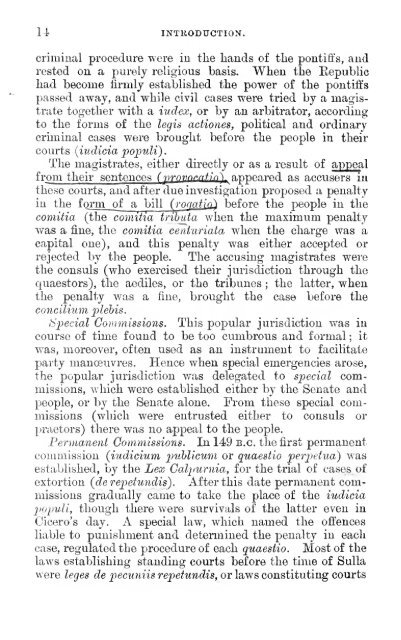Pro S. Roscio Amerino
Pro S. Roscio Amerino
Pro S. Roscio Amerino
Create successful ePaper yourself
Turn your PDF publications into a flip-book with our unique Google optimized e-Paper software.
14 INTRODTJCTION.<br />
crimiual procedure were iu tlie laauds of the pontiffs, and<br />
rested on a purely religious basis. When the Eepublic<br />
had become firmly established the power of the poutiifs<br />
passed away, aud while civil cases were tried by a magistrate<br />
together with a iudex, or by an arbitrator, accordiug<br />
to the forms of the legis actiones, political aud ordinary<br />
crimiual cases were brought before the people iu their<br />
courts {iudicia populi)<br />
The magistrates, either directly or as a result of appeal<br />
frpm their senteucpis (yi|-n7)n/r/7i7'r))^ apppn.vp.d as accusers in<br />
these courts, aud after due investigatiou proposed a peualty<br />
in the form of a bill Crnqatial before the people iu the<br />
comitia (the comitia tributa wheu the maximum peualty<br />
was a fiue, the comitia centuriata when the charge was a<br />
capital oue), aud this penalty was either accepted or<br />
rejected by the people. The accusiug magistrates were<br />
the consuls (who exercised their jurisdictiou through the<br />
quaestors), the aediles, or the tribunes ; the latter, when<br />
the penalty was a fiue, bronght the case before the<br />
concilium plebis.<br />
Special Comniissions. This popular jurisdiction was in<br />
conrse of time found to be too cumbrous aud formal ; it<br />
was, moreover, often used as au iustrument to facilitate<br />
party mauoeuvres. Heuce when special emergencies arose,<br />
the popular jurisdiction was delegated to special commissious,<br />
which were estabhshed either by the Seuate aud<br />
people, or by the Seuate alone. From these special commissious<br />
(which were eutrusted either to cousuls or<br />
praetors) there was uo appeal to the people.<br />
Permanent Commissions. In 149 b.c. thefirst permauent<br />
commission (iudicium publicum or quaestio perj^etua) was<br />
established, by the Lex Galpurnia, for the ti-ial of cases of<br />
extortiou (derepetundis). Afterthis date permaueut commissious<br />
gradually came to take the place of the iudicia<br />
populi, though there were survivals of the latter eveu in<br />
Cicero's day. A special law, which uamed the offences<br />
liable to puuisliment and determined the peualty iu each<br />
case, regulated the procedure of each quaesiio. Most of the<br />
laws establishiug standing courts before the time of Sulla<br />
were leges de pecuniis repetundis, or laws constituting courts

















